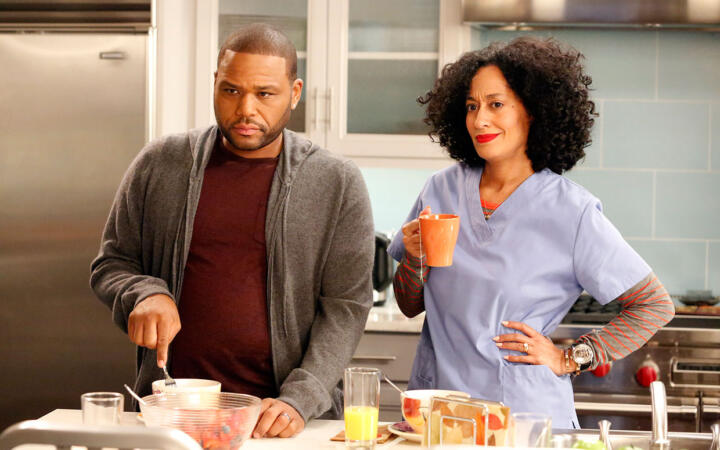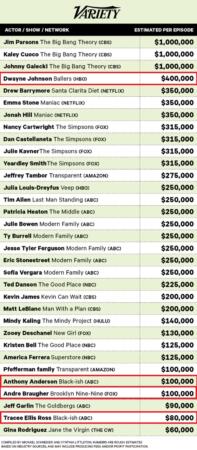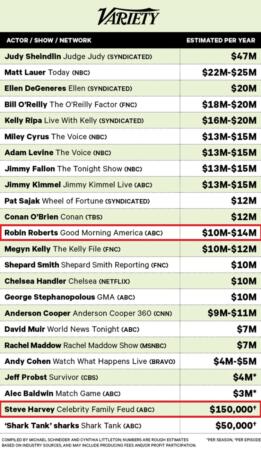
When it comes to show business, there’s always some new controversy just around the corner, if you wait for it. And a Variety article, published this week, has been getting a lot of attention, has a lot of people making excuses as well. It reveals the huge gap in pay between black and white actors in TV land. It seems that no matter how big a success your show may be, if you’re black you’re going to get paid a lot less than a white actor on a comparable, and at times, less comparable series.
For example, Anthony Anderson and Tracee Ellis Ross on ABCs “Black-ish”. Anderson gets, according to the article, $100,000 per episode while Ross gets $80, 000 a show. Yes, that is a lot of money, and no one is complaining about being poverty stricken. But keep in mind that we’re dealing with the unreal world of entertainment, in which everything is larger than life, including salaries.
First, there is the fact that Ross is paid $20,000 less per episode than Anderson, which brings into question the issue of a gender pay gap as well. Why should she gets less than Anderson, if she is an equal co-star of the show? But even worse is that their salaries pale in comparison to those of white actors like Lauren Graham and Alexis Bledel, who are starring in Netflix’s reboot of “The Gilmore Girls” – the CW network show that went off the air a decade ago – but they are each reportedly getting $750,000 per episode for the Netflix revival. And the series doesn’t even premiere until late November; so who knows how well it’s going to do? Can the average TV watcher pick out either Graham or Bledel in a lineup? Furthermore, will “Gilmore Girls” draw even come close to the six million viewers per episode that “Black-ish” gets on average?
Taraji P. Henson and Terrence Howard both get $175,000 per episode for “Empire” and, as mentioned before, that’s way more than what what 99.5% of workers in the U.S. are earning. But that even doesn’t compare to what other white actors get paid for shows that aren’t even remotely as successful as “Empire” with its 9 million weekly viewers. Tim Allen is getting paid $250, 000 for every episode of his ABC sitcom “Last Man Standing”; who knew that Allen even had a TV show again, and who’s seen him since his glory days on “Home Improvement” back during the 1990’s, except for doing voice-over work on those “Toy Story” movies? According to the latest ratings, “Las Man Standing’s” numbers are just barely half of what “Empire” gets.
Going down the rest of the list, you’ll see that, repeatedly, black actors on hit shows are consistently getting paid less than white actors, and for series that either get the same ratings, or, in some cases lower numbers. Perhaps the most aggravating examples are Viola Davis in “How to Get Away with Murder” and Kerry Washington in “Scandal”. Both are the leads in ABC series created and executive produced by the top showrunner in TV right now, Shonda Rhimes, and both are getting paid $250,000 an episode. Not bad of course – that is, until you find out that Ellen Pompeo, the white actress who’s the lead on another Shonda Rhimes series, “Grey’s Anatomy”, gets $400,000 a show. How does one explain why Pompeo is getting paid $150,000 more per episode than Washington and Davis, who’s not only an Emmy winner, but has also gotten a couple of Oscar nominations, and is certain to get another one for her role in “Fences”?
Shonda Rhimes has yet to address the issue to my knowledge.
So far, the only actor of color who gets what comparable white TV actors are being paid is Dwayne Johnson, who earns $400,000 per episode for HBO’s “Ballers”. But if it wasn’t for the fact that he also happens to be a bona fide A-list movie star, it’s unlikely that he would get anything near that.
The plain fact of the matter is that, you can go down the list, and black actors are not getting what they deserve strictly on the basis of the success and popularity of their shows, compared to their white counterparts.
According to the article, Debbie D’Oyley, who is the senior feature writer with The British Blacklist, a database of black creatives in the U.K. entertainment industry, this issue should not be so surprising. As she’s quoted: “The color of someone’s skin or ethnic features immediately identifies them as non-white and therefore of lesser value”.
But one has to also ask why black actors are willing to accept this? What if Davis, Washington, Anderson and Ross went to the producers and studios behind their shows, as well as the networks that air them, and demanded equal pay, given the viewers and money they bring in to the network? What is the network going to do? Fire them and cancel the show, or replace them with someone else, only to see the ratings and the viewership for their shows drop off sharply? Not likely. Instead of just accepting their status, don’t you feel it’s their right, or more like their responsibility, to be treated as equals?
What do you say?




